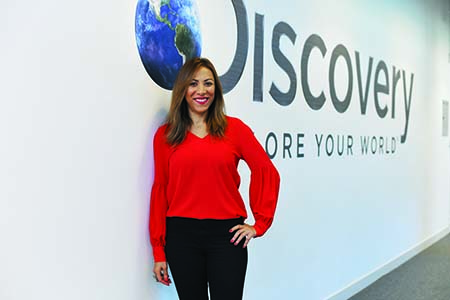Discovery Channel MENA draws on its success with Fatafeat to create original long-form content for its Pay-TV channel TLC HD, and bespoke short-form content for digital platforms. In conversation with Nahla Elmallawany, Head of Content, Discovery MENA.

Discovery Channel MENA draws on its success with Fatafeat to create original long-form content for its Pay-TV channel TLC HD, and bespoke short-form content for digital platforms. In conversation with Nahla Elmallawany, Head of Content, Discovery MENA.
As with all broadcasters in the region, Ramadan is a special month. Tell us more about the 360-degree approach you adopted to creating content for Fatafeat during the month of Ramadan.
At Discovery, Ramadan is always a crucial period for us, and an opportunity to position Fatafeat our flagship Arabic food brand as the key destination for audiences across the Middle East during the month of Ramadan. This year, our Fatafeat Ramadan strategy was truly 360, with a diverse line-up of locally produced shows on the linear channel, plus a fan-focused digital strategy which ensured our Fatafeat community experienced the true spirit of Ramadan, both on- and off-screen.
From a programming perspective, Ramadan 2018 saw us expand Fatafeats genre offering with the introduction of a lifestyle series presented by brand-new talent professional life coach Leila Almaeena, to bring in a wider viewership. And as ever, we ensured Fatafeats core viewers were fully prepared for the holy month, thanks to our competitive line-up of brand-new cookery shows from some of the Middle Easts most renowned celebrity chefs, including Chef Manal Al Alem, Chef Leyla Fathalla and Chef Wafik Belaid.
But this 360 model wasnt limited to Ramadan; in fact, its something we now apply to all our campaigns on Fatafeat. Whether its producing new shows for linear, including the the series Mays Kitchen, Matbhakna Al Arabi (Our Arabic Kitchen) and Maa Sou Atyab (So Delicious), or the digital-first content we produce (more than 800 short-form videos in 2018), our strategy is to ensure were always engaging with our Fatafeat fans across every touchpoint.
How has the digital opportunity affected your workflow?
We are leading on the digital front. We started nearly two years ago with short-form recipes and now weve customised our production and editing based on the digital platform the content is showcased on.
We have also adapted our deliverables around digital. Our inhouse crew has incorporated producing bespoke digital content as part of its workflow with the allotment of additional time. Thanks to this new strategy, we have amassed a fan base of half a million on YouTube, around 700,000 subscribers on Instagram and around five million on Facebook, among others. To keep our fans engaged, we now produce an average of 800 bespoke pieces of content each year for digital platforms, and each platform has its requirements: with Instagram you have glossy, magazine-quality style of production; on YouTube, it is more spontaneous, and with Facebook you have article-style content with recipes, and so on.
Our digital platforms also offer immediate feedback from the audiences. If a video performs better, we analyse what aspects helped from the recipe and talent to the editing style, among other aspects. We are able to monitor and fine-tune our content based on feedback. The response has been enormously encouraging and our Fatafeat talent have been more than forthcoming to create content for digital platforms.
We have recently signed a partnership with Snapchat as part of their Discover feature; they have a very collaborative approach towards content creation. It is the same with other platforms such as Facebook. We seek their advice on how best to engage with their audiences. It has been rewarding revenues from digital platforms have surpassed revenues from linear channels. What has allowed us to move so strongly into digital is the permission from management to fail forward, otherwise we wont learn and grow. Moreover, something that works today may not tomorrow. Trends evolve. We have permission to experiment, so there is a certain fearless approach to our new initiatives.
You launched the third season of the Arabic travel show My World to You on TLC HD, the lifestyle and entertainment channel. What can viewers expect in this season?
With our series, My World to You we concentrate on one country per season. The first season covered Thailand. We focused on Tunisia for the second season. In the third season, the host Darine El Khatib takes us through little-known facets of life in Jordan over 10 episodes. Even as Arabs, there is so much to know about a country, especially when the host enters homes and other spaces only locals know about. While the show is in Arabic, there are English subtitles catering to the mixed audience TLC reaches out to.
You are working with local partners on My World to You. Tell us more about the content creation process.
We are working with Jordan-based broadcasters Roya TV. We wanted a local partner, because they know the hidden gems in the country and they know how to facilitate logistics. The Roya TV crew is working under our supervision our executive producer flew in and attended the shoot. Overall, it is a very collaborative approach. We encourage partnerships with different local teams, because that allows for diverse content.
Also, these partnerships are a win-win for both pay-TV and FTA channels such as Roya. We share expertise and we cater to different audiences. While we can have the programme premiere on pay TV, the content can air on FTA channels after a period, to a different audience. For us, its important that we bring locally relevant content to Arab audiences, thats why weve invested in producing 300 hours of original long-form programming this year alone.
As a broadcast professional, from your start as a dubbing producer for Disney films in Egypt many years ago to your current position, what changes are you seeing among audiences in the region?
We are seeing the development of new regional content creation hubs beyond Egypt, where content creation has historically been based, in places such as Kuwait, Jordan, Lebanon, among others. As storytellers, we are keenly aware of how diverse the region is and when we feature, for instance, Emirati content, we make sure that the fine balance between being true to the culture and allowing the content to travel in the region is maintained.
Content is travelling like never before. Earlier, people would watch local channels, or at the most Egyptian channels. Now they are watching content from across the Middle East and are intrigued. Apart from digital platforms, pan-Arab talent shows have also made people more open to diverse content.
We are committed to creating quality content in Arabic. At Discovery, the challenges with producing local content is finding great stories that can travel. Our team takes immense pride in the fact that the recent documentary Wild Dubai was screened across Discoverys network of channels in 12 global territories, as far as Europe, Asia and Africa. Stories offering unique perspectives from this region can travel not just regionally, but internationally.















































































